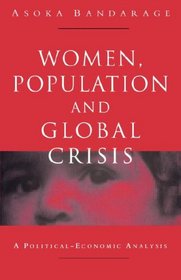Search -
Women, Population and Global Crisis: A Political-Economic Analysis
Women Population and Global Crisis A Political-Economic Analysis
Author:
It has been widely assumed that over-population is one of the root causes of global crisis; even amongst feminist and environmental movements, the common wisdom on population has never been seriously critiqued. This book provides that critique; it gives a historical overview of the population question and places the population-poverty-environmen... more »
Author:
It has been widely assumed that over-population is one of the root causes of global crisis; even amongst feminist and environmental movements, the common wisdom on population has never been seriously critiqued. This book provides that critique; it gives a historical overview of the population question and places the population-poverty-environmen... more »
ISBN-13: 9781856494281
ISBN-10: 1856494284
Publication Date: 5/15/1997
Pages: 384
Rating: ?
ISBN-10: 1856494284
Publication Date: 5/15/1997
Pages: 384
Rating: ?
0 stars, based on 0 rating
Genres:
- Business & Money >> Economics >> Economic Policy & Development
- Business & Money >> Popular Economics
- History >> World >> General
- Nonfiction >> Current Events >> Poverty >> Social Services & Welfare
- Nonfiction >> Social Sciences >> Demography
- Nonfiction >> Social Sciences >> General
- Nonfiction >> Social Sciences >> Sociology >> General
- Nonfiction >> Women's Studies >> General





